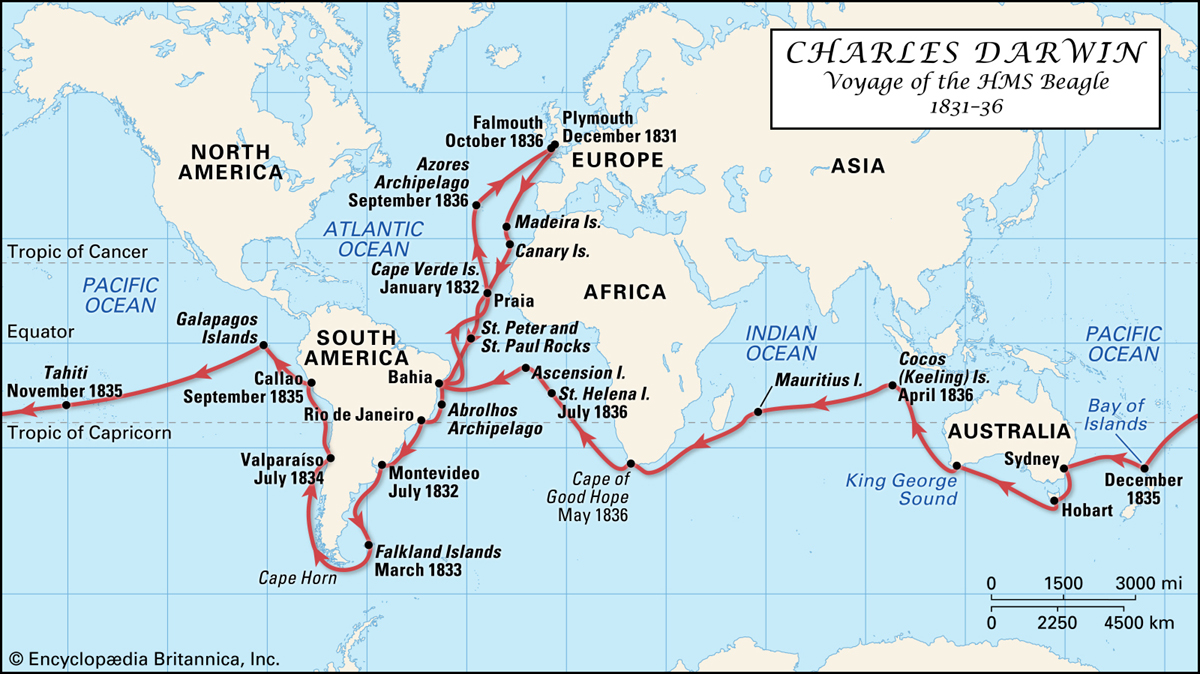|
HMS BEAGLE
The HMS Beagle was the famous ship for her
naturalist research journey with the young
Darwin on board. In total, HMS Beagle made 3
great voyages. Out of the nearly five years of
the ship's second expedition, Darwin
spent three years and three months on land and
eighteen months at sea.
.jpg)
HMS Beagle was was launched in 1820 on the River Thames. She became the
first fully rigged man-of-war
to pass under the old London Bridge when she
took part
in celebrations of the coronation of King George
IV.
In 1825,
HMS Beagle was converted to a bark by the
addition of a small mizzenmast, a forecastle,
and a large poop cabin. For her first commission
(1826–30),
HMS Beagle was sent on a voyage to survey
the coasts of South America.
On the second
voyage (1831–36), HMS Beagle had Darwin
onboard. A goal of the voyage was to
obtain a complete circle of measurements of
longitude, a feat requiring the use of 22
chronometers and accomplished within only 33
seconds of error. She was so crowded that Darwin had to
sleep in a hammock slung above the drafting
table in the poop cabin.
On
January 16, 1832, HMS Beagle arrived at the Cape Verde Islands
and anchored on the island of Santiago.
It was here that Darwin made his first
discovery. He found a horizontal white
band of shells within a cliff face along a
shoreline. The fact that this layer was forty-five
feet above sea level raised some questions for
Darwin. This observation, and many similar others,
would later lead Darwin to develop his own theory of
raising continents and sinking ocean floors.
.jpg)
Darwin collected and made
detailed observations of plants and animals, with
results that shook his belief that species were
fixed. He kept a diary of his experiences, and
rewrote this as the book titled Journal and Remarks,
published in 1839. This travelogue and scientific
journal became widely popular, and was reprinted
many times with various titles, becoming known as
The Voyage of the HMS Beagle.
Darwin’s voyage on
the Beagle laid the foundation for his theories
of evolution and natural selection and
profoundly affected the course of modern
scientific thought.
HMS Beagle sailed across the Atlantic Ocean, and
then carried out detailed hydrographic surveys
around the coasts of the southern part of South
America, returning via Tahiti and Australia after
having circumnavigated the Earth. While the
expedition was originally planned to last two years,
it lasted almost five.
During the
HMS Beagle’s third voyage (1837–43), the
first full surveys of the coasts
of Australia was accomplished.
After 18 years of
hard service, the
HMS
Beagle ended her days as the Beagle Watch vessel
moored at Pagelsham Pool on the coast of Essex. She was sold for scrap in 1870.

.jpg)
This primarily
wood HMS Beagle features:
-
Plank-on-frame
construction.
-
Copper-plated bottom:
real individual copper pieces (no fake lines.)
- Authentic extensive rigging system comprised of many
different sizes of rope and features numerous blocks and
deadeyes.
- Boats are crafted individually from wood. They are
not plastic made from mold.
- Lower sails are furled to
beautiful deck details.
41" long x 31" tall x
11.5" wide $3,290
 Shipping
and insurance in the
contiguous US included.
Other places: $600 flat rate.
This
model is in stock and will be shipped within 5 business
days.
Shipping
and insurance in the
contiguous US included.
Other places: $600 flat rate.
This
model is in stock and will be shipped within 5 business
days.

Learn more about premium tall ship models
here.
Learn more about the HMS
Beagle model here:
https://en.wikipedia.org/wiki/HMS_Beagle
|